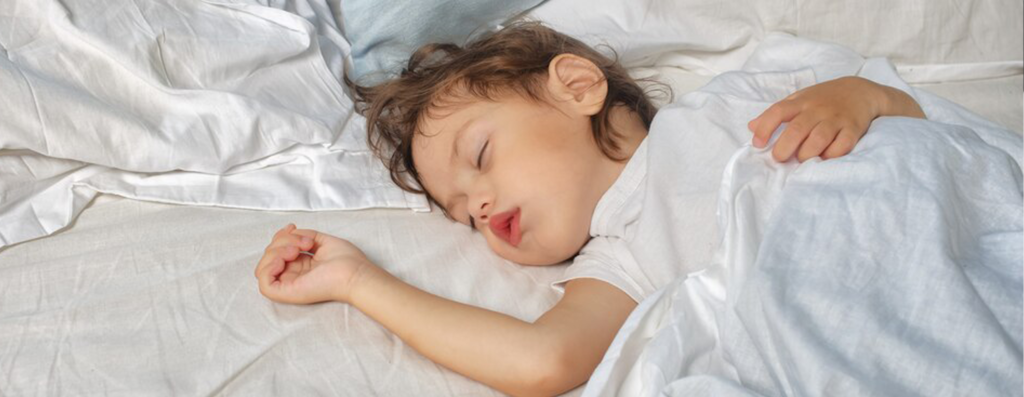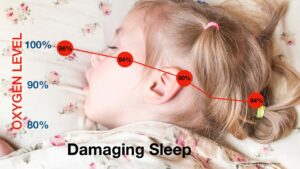Child Brain Development: critical for creating and maintaining the environment that develops cognitive, emotional, and social growth. Absolutely required for this is the proper combination of REM Sleep and Oxygen simultaneously.
Before Birth: Prenatal Brain Development
Begins at conception and continues through birth.
Neural tube forms, laying the foundation for the brain and spinal cord.
Key influences: maternal health, nutrition, and environmental exposures.
Proper rest for the mother, potentially monitored with a home sleep testing device, can significantly impact fetal Brain Development.
0-2 Years: Infancy Brain Development – Their Natural mouth open ‘Sleep Posture’ can result in a 35% less Oxygen intake which is Necessary for Brain Development.
- Rapid brain growth and synaptic formation.
- Sensory experiences and motor skills development.
- Crucial period for attachment and emotional bonding.
High Quantities of both REM and NREM Sleep are required simultaneously. REM Sleep values are thought to be more directly involved in Early Brain Development. Multi-session sleep Tests provide an Evaluation of the Sleep Cycle as a Process relating it to the Brain Development Process.
2-6 Years: Early Childhood – during this period children suffer more from ‘Breathing Dysfunctions’ that either Adult Males or Adult Females.
- 85% of the Child’s Brain Develops by AGE 5 years.
- Intensive Language and communication skills.
- Development of social skills and self-control.
- Enhanced problem-solving abilities.
Supporting Brain Development: Creating a stable HEALTHY sleep routine ensures that children get the necessary rest to support their cognitive and emotional growth.
6-12 Years: Middle Childhood Key – development of cognitive functions and academic skills.
- Refinement of motor skills and coordination.
- Increased capacity for logical thinking and understanding complex concepts.
For obvious sleep disorders, multi-session sleep testing, ensures Sleep Process Evaluation to monitor good sleep process hygiene, which is essential for optimal learning and behavior oversight.
12-18 Years: Adolescence –
- Continued brain maturation, especially in the prefrontal cortex.
- Development of abstract thinking, planning, and decision-making.
- Formation of identity and independence.
Addressing potential sleep issues with ‘Multi-Session Sleep Testing’, a sleep process test that can provide ‘Prophylactic Sleep Monitoring’ to prevent the negative effects of sleep dysfunctions. Again supporting overall brain health, elevated academic performance and the development of lifelong ‘Healthy Sleep Patterns’.
Conclusion
Each stage of a child’s brain development is unique and critical. Ensuring adequate ‘Brain Developing Sleep’ and Required Oxygen Intake through regular monitoring and addressing sleep disorders can significantly enhance cognitive and emotional growth. Incorporating tools like home sleep testing devices can help maintain a healthy sleep routine, fostering better development outcomes.
FAQs on Child Brain Development and Sleep
- How does sleep affect my child’s brain development?
Sleep is crucial for brain development in children. It supports memory consolidation, learning, and emotional regulation. Adequate sleep helps with cognitive functions such as problem-solving, attention, and creativity. Monitoring and ensuring good sleep hygiene can significantly enhance your child’s developmental outcomes.
- What can I do if I suspect my child has a sleep disorder?
If you suspect your child has a sleep disorder, such as sleep apnea, it’s essential to consult with a healthcare professional. They may recommend a sleep apnea test or the use of a home sleep testing device to monitor and diagnose the issue. Early intervention can help manage sleep disorders effectively and support your child’s overall health and development.
- Are there specific sleep requirements for different stages of child development?
Yes, sleep requirements can vary greatly by age:
- Infants (0-1 year): 14-17 hours daily.
- Toddlers (1-2 years): 11-14 hours per day.
- Preschoolers (3-5 years): 10-13 hours per day.
- School-age children (6-12 years): 9-12 hours per day.
- Teenagers (13-18 years): 8-10 hours per day.
Ensuring your child gets the recommended amount of sleep is vital for their ‘Brain Development’ and overall well-being.




